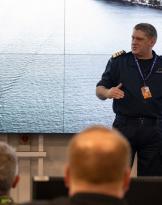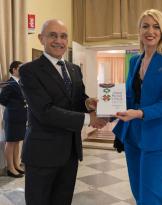Today the festival of the environment is celebrated all over the world, a hot topic that particularly involves our country due to the thematic notes of pollution that affect it incisively. World Environment Day-WED is the anniversary aimed at raising awareness and mobilizing political authorities and public opinion on environmental issues to safeguard life on our planet. It was established by the UN General Assembly in 1972 in remembrance of the Stockholm Conference on the Human Environment when the United Nations Environment Program (UNEP) was defined. UNEP is an international body that aims to promote environmental protection and the sustainable use of natural resources, through research funding and initiatives for the protection of flora and fauna with the aim of encouraging productivity while respecting of nature.
"Connecting People to Nature" is this year's theme that involves the binomial between people and nature, in relation to the objectives of the UN Agenda 2030 for sustainable development, which emphasizes the desire to protect the planet from environmental degradation . Among the primary objectives, the protection of ecosystems and the sustainable use of marine and terrestrial resources remain in pole position because it is our very existence that is compromised if serious measures are not taken that see non-renewable resources exhausted on the one hand and on the other. another is environmental sustainability which risks damaging the future of the earth.
This year World Environment Day has Canada as the host country that will officially celebrate the event, with a population of 36 million inhabitants and an immense territorial extension, rich in forests and natural resources, which is witnessing a phenomenon disastrous transformation of green into desertified land following large investments in oil extraction, while the use of alternative forms of energy is being debated to make the country cleaner, such as equipping all post offices with electric vehicles and columns top-ups open to the public.
Globally, the call remains only one: the relationship between man and environment cannot be dissociated from initiatives that, by putting forward only the capital, end up creating irreparable and burdensome damage to the environment itself and to man, given that it is the planet that provides the essential elements. to life and food, such as land, water and air and for which nobody can hold back, being part of the general ecosystems threatened by pollution, soil erosion due to intensive land use and climate change.
For Italy, the World Environment Day close to the G7 in Taormina has an even more important meaning, as it falls one week after the G7 in the Environment area, with an initiative that sees Bologna on 11-12 June 2017, become the international capital of the environment with working tables with the Ministry of the Environment, local authorities and the associative world. The goal is to develop shared proposals to implement the points of the Paris Agenda on climate change and the 2030 Agenda on sustainable development.
A new model of sustainable development must relate work, life, environment, health and safety in such a way that the limited resources of the planet are shared equally with the awareness that the waste cycle affects the environmental and existential process and for which it is it is urgent to establish the rules of reuse and disposal that do not irreparably damage nature. The Mediterranean, for example, is a reason for understanding on the issue of pollution between the countries that overlook it due to the seriousness of its state and for which immediate action is needed (v.articolo)

In fact, Italy is represented by over three thousand kilometers of coastline with large stretches of beaches interspersed with cliffs subjected to tourist invasions, cement, pollution discharges due to excessive human settlement. Its sea is connected to the uses and abuses that all the countries of the Mediterranean basin but also to the other countries that, when they pollute their waste also come to us like microplastics, heavy metals, industrial discharges becoming food of the marine fauna and compromising a particular biodiversity that characterizes the Italian sea and for which the work still to be done is really so much.
In addition to the environmental police forces, many associations are fighting every day for the defense of our environment, operating not only a new culture on the use of natural resources but also with concrete initiatives that remain however in a limited context, requiring for the intensity of the a large-scale state intervention. We are talking about polluted soil, illegal landfills, separate waste collection that finds virtuous municipalities such as Treviso that invests in innovation in recycling with companies that manage to obtain raw materials from the transformation of most of the waste and municipalities that throw everything into landfills. Pollution follows like in Augusta and Priolo, Taranto, Marghera, etc. despite the existence of the new law on ecoreati n. 68 of the 2015 which provides for the prison for those who pollute, the work to be done remains high. While in Gela in Sicily a series of interventions all start with all characterized by high technological and research content and high environmental sustainability.
Then there is no adequate policy for renewable energy such as wind, biofuels, photovoltaics, knowing that with 10% of biofuels alone, three million vehicles could circulate and with 1% of photovoltaic we could have energy for a year. One wonders why the Italian State with all the apparatus of the Public Administration does not impose "greening" for its offices and means, being able not only to set an example and at the same time to launch the green economy sector with a revival of economy and jobs. Begin a serious fight against urban pollution from fine dust, that of plastic and food additives, that of food quality with the affixing of labels that provide complete traceability, start a real information campaign on junk food and prohibit that this could invade the tables of Italians causing significant health consequences that affect national health costs. These are all initiatives that await a serious re-launch for the well-being of the country and the planet.
Then there is the not negligible problem related to the disposal of radioactive waste which represents a very delicate issue for the territory, considering that this waste is produced by nuclear power plants (in Italy they are not active and are being dismantled), by radiological medicine activities and therapeutics and from industry in its various applications. Then there are those radioactive waste that is scattered in some areas or lies at the bottom of the sea. Those regularly detained are kept in temporary deposits for safe keeping pending a national deposit to be built that will allow their final accommodation in full environmental safety. For those identified and to be identified on the ground and for those at the bottom of the sea, it is necessary to start a safety and remediation plan to stop environmental contamination on flora and fauna and on the human food chain, considering that there would be hundreds and hundreds from North to South "the lands of fires" along the Italian boot and so too a hundred cargoes sunk in the Mediterranean containing plutonium and other radioactive waste with wide-ranging criminal involvement and with investigations still underway by various prosecutors and the Commission of inquiry into illicit activities related to the toxic waste cycle. We recall that the environmental impact on human health is the main factor to be highlighted and that the thousands of deaths from cancer are a testimony that requires us to run for cover with the recall of the World Health Organization which confirms that 90% the increase in cancer and oncological pathologies is due to the pollution caused by toxic waste on the land and in the sea.
The most important aspect, however, always falls in the fight against ecoreati and the depollution of water and soil. We recall that in the 2016 the most relevant investigation for the number of pre-trial detention orders was the Operation Poseydon, conducted by the Port Authority of Taranto and the Finance Police and ended with 14 arrests for crimes of pollution and environmental disaster, as well as for the illegal manufacture and possession of bombs and explosive substances. The investigation concerned the Gulf of Taranto, stormed by a band of poaching fishermen, who, in order to raid the seabed as much as possible, had chosen explosives and war remnants from the Second World War as fishing tools. This is one of the examples that must make us understand that today talking about environmental protection and eco-crimes is an aspect that requires numerous contrast and control resources that must not only be organized with single management centers but have men and resources available. that in addition to specific skills combine membership in organizations that can count on the availability of resources and means on a large scale. In addition to the environmental police perhaps, it would be necessary to evaluate how these organizational elements are present in the Armed Forces that may be suitable for creating an operational line of the task force type that also uses redundant personnel, auxiliary personnel that together with other state bodies, research and associative nature can constitute a strong bulwark to avoid the destruction of nature that will inevitably lead to the destruction of man.
Each of us on this day is called to reflect and make a contribution by changing our relationship with the environment we do in only one way: by loving it as if we were ourselves.












